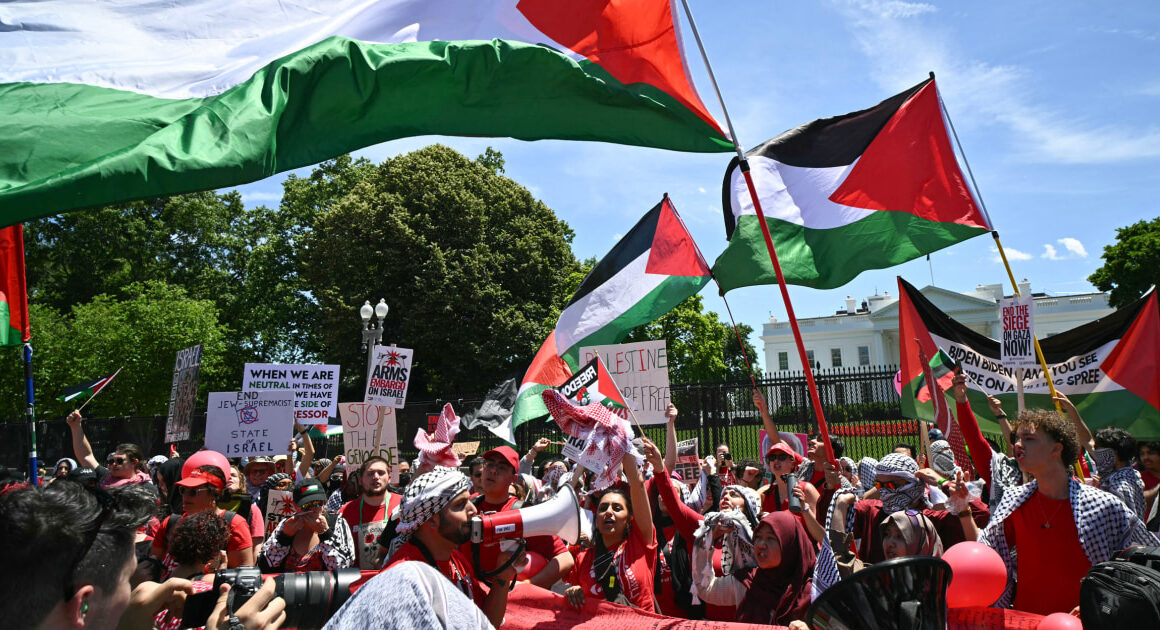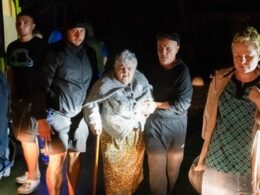Since the Oct. 7 Hamas terrorist attack on Israel, Donald Trump and other senior GOP leaders have repeatedly called for the Biden administration to revoke the visas of foreign nationals in the U.S. who openly support Hamas or other U.S. designated terrorist organizations.
Last month, one of the 20 promises in the preamble of the platform adopted at the Republican National Convention was to “deport pro-Hamas radicals and make our college campuses safe and patriotic again.”
But protest organizers contend that Trump and other Republicans are ignoring key facts. The overwhelming majority of demonstrators are U.S. citizens who, under the First Amendment and current U.S. law, have the right to express pro-Hamas, antisemitic or anti-Israel views as long as they don’t break the law.
And Muslim American civil rights organizations say the vast majority of pro-Palestinian protests have been peaceful and showed no public displays of support for Hamas.
The protests, which spread across American college campuses and took over streets in some cities this spring, are expected to flare up again at the Democratic National Convention in Chicago next week.
GOP officials and pro-Israel groups told NBC News that they have so far identified only four foreign students on academic visas who were reportedly arrested, barred from graduation or expelled for participating in unauthorized campus protests.
Former Trump administration officials argue that more foreign students are involved in the campus protests and accuse the Biden administration and universities of withholding such information.
Biden administration immigration officials told NBC News that, as of July, they had not terminated any student, or F-1, visas based on protest activity related to the Israel-Gaza war.
The four students flagged by Republicans and pro-Israel groups attended Harvard, Columbia and Emory universities and the University of Pennsylvania. The universities declined to comment, citing privacy concerns, or didn’t respond to requests for comment. The four students didn’t respond to requests for interviews.
Civil liberties groups say attempts to deport protesters who are visa holders for speech-related offenses would spark legal battles nationwide.
Ben Wizner, director of the American Civil Liberties Union’s Speech, Privacy and Technology Project, argued that foreign nationals who are visa holders are also protected by the First Amendment. He contended that it would be unconstitutional for authorities to try to deport them based solely on their expressing support for Hamas at protests.
“No administration has ever really tried to do this,” Wizner said. “It would be an incredibly novel and extreme policy to remove people from the country simply for their political advocacy in a country that was founded on treasonous political advocacy.”
Reed Rubinstein, a former Trump administration official who is senior vice president at America First Legal, a public policy law firm founded by former Trump adviser Stephen Miller, said foreigners, on visas or seeking them, aren’t allowed to endorse terrorist groups.
“Wearing your little Hamas band, saying, ‘Yea, I support Hamas,’ if you are an alien, that should get you tossed out of the country,” said Rubinstein, who held leading positions at the Justice and Education departments under Trump. “Standing there waving your Hamas flag, saying, ‘I love Hamas,’ if you’re a U.S citizen, it’s fine.”
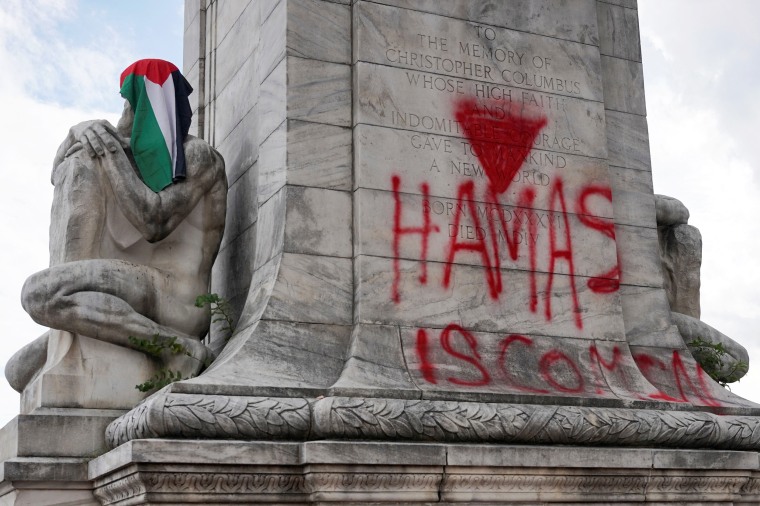
Debate over protests
Over the last 10 months, Republicans in Congress have repeatedly proposed bills and sent letters calling on the Biden administration to enforce immigration laws that say foreign visitors aren’t eligible for visas or admission into the country if they “endorse” or “espouse” terrorist activity.
“When I am president, we will not allow our colleges to be taken over by violent radicals,” Trump told a crowd in New Jersey in May. “If you come here from another country and try to bring jihadism or anti-Americanism or antisemitism to our campuses, we will immediately deport you.”
An NBC News review of videos, photographs and news accounts of demonstrations on college campuses this spring found that signs specifically declaring support for Hamas weren’t prevalent, but there were reports of violence and property destruction.
Many signs and chants focused on the high number of civilian deaths in Gaza. About 40,000 Palestinians have died in Gaza since Hamas’ terrorist attack on Oct. 7, according to local health officials.
Some called for an intifada, or armed uprising, and for pushing Israelis out of the country “from the river to the sea,” language that many see as a call for the destruction of the state of Israel. Others called for the establishment of a Palestinian state.
Over the summer, pro-Hamas rhetoric appeared to increase at some protests. When demonstrators flooded Washington, D.C . , streets in response to Israeli Prime Minister Benjamin Netanyahu’s visit last month, some spray-painted “Hamas Is Comin” on a statue outside Union Station. Next to the threat was an inverted red triangle, which Hamas’ military wing has used to mark its targets. Some protesters say it is a symbol of Palestinian unity.
Law enforcement officials in Washington later released photos of several protesters, some holding cans of spray paint, and asked for help identifying them. At least 19 people were arrested. Law enforcement officials told NBC News that they don’t seek out visa information, nor contact federal immigration officials after an arrest, because Washington is a sanctuary city.
In New York City, two people were recently charged with hate crimes, police say, for an incident in June in Brooklyn. Vandals spray-painted an inverted red triangle and other anti-Israel graffiti on an apartment building where the director of the Brooklyn Museum, who is Jewish, resides. They also unfurled a banner that called her a “white supremacist zionist.”
And in July protesters waved Hamas flags during an anti-Israel demonstration in Times Square. Five people were arrested and charged with reckless endangerment.
Law enforcement officials in New York, which is also a sanctuary city, declined to say whether the individuals arrested in Brooklyn and Times Square were visa holders.
An NBC News investigation this year found no clear evidence financially linking Hamas or any foreign governments to the protests in the U.S.
What did emerge was a vast network that includes left-leaning, billion-dollar American philanthropies and collaboration with at least one foreign organization that Germany and Israel have banned over allegations it worked with or supported Hamas and another terrorist group.
Some U.S.-based protest groups promoted rhetoric or speakers from the Popular Front for the Liberation of Palestine, which the U.S. also designates as a terrorist organization.
But the pro-Palestinian protest movement, overall, appears to be grassroots, with localized efforts that coordinate primarily through social media. Protests are expected to resume at universities in a few weeks when students return to campus.
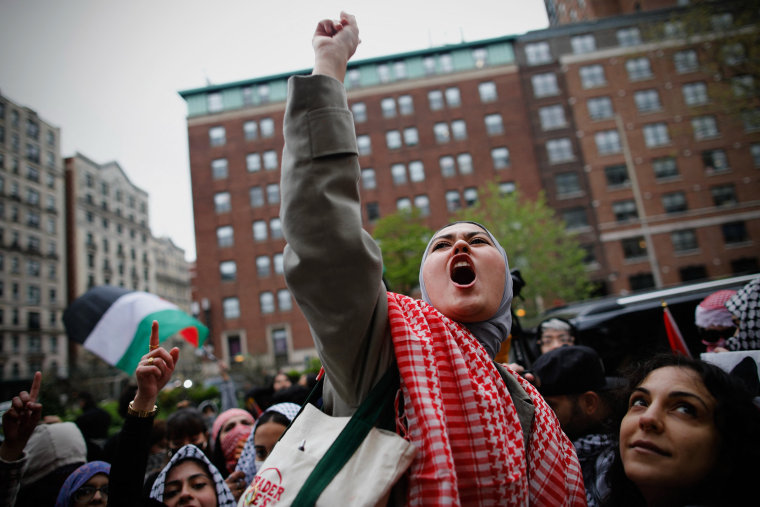
Biden’s approach
Biden administration officials told NBC News that Trump’s threats don’t match the realities of the country’s overburdened immigration system. They argue that it is more important to expel foreign nationals in the U.S. who are committing violent crimes, as opposed to protest-related offenses such as vandalizing buildings.
They also argue that terminating visas isn’t as simple as Trump contends. If a visa holder is charged with violating immigration or criminal law, the case often goes before a judge who then has to decide whether the person violated the visa’s terms.
“The United States supports the ability of anyone to peacefully protest, to demonstrate, to make their voices heard, and to express themselves in a peaceful and nonviolent way, consistent with federal, state, and local laws,” a spokesperson for the State Department, which has the authority to revoke a person’s visa, said in a statement.
A spokesperson for Immigration and Customs Enforcement said reasons to begin proceedings to remove a student from the country include a criminal conviction for a violent offense that carries at least a year in prison or “failing to make normal progress in a course of study, or other regulatory violations.”
ICE regulations state that schools are also required to inform immigration officials within 21 days if students fail to maintain or complete their academic programs. ICE officials must also be informed if a school takes disciplinary action against a student who is convicted of a crime. ICE policies don’t specify what type of crime.
“To initiate removal proceedings against a student, there must be evidence of a status violation,” an ICE spokesperson said.
Jon Feere, an ICE senior adviser in the Trump administration, said the Biden administration isn’t sufficiently focused on ensuring that foreign students are following the terms of their visas.
“The last thing we should want is for foreign students to return home with the impression that the United States embraces rioting and violent speech, but that’s exactly the result when this type of activity is ignored by universities and the federal government,” said Feere, now the director of investigations at the Center for Immigration Studies, a think tank that promotes restricting immigration.
A second Trump term
America First Legal, the Washington-based public policy law firm founded by former Trump aides, sued the Biden administration in April. It argued that the Education Department is purposely protecting “pro-Hamas foreign extremists on American college campuses” and failing to provide records on foreign students, or pro-Hamas activities, at schools.
“They don’t even want to touch this,” said Rubinstein, the former Justice Department official.
In federal court papers filed in June, the Education Department denied the allegations and said it was still working on the group’s request for documents. Kenneth Marcus, who ran the Education Department’s Office for Civil Rights during the Trump and George W. Bush administrations, said a second Trump administration would most likely target foreign students who participate in unlawful protests.
“The Biden administration has done a lot of outreach and publishes a lot of guidance documents, letters, toolkits and the like,” said Marcus, who leads the Louis D. Brandeis Center for Human Rights Under Law, a nonprofit organization that has sued multiple universities alleging discrimination toward Jewish students since Oct. 7.
Marcus criticized a toolkit the Education Department published last month with recommendations for universities to follow during protests that are hard to manage. Suggestions include communicating the schools’ core values to the public and identifying outside groups that are fanning tensions.
“It lacks any particular teeth and doesn’t move the ball forward,” Marcus said.
A spokesperson for the Education Department defended the Biden administration’s record. She said the Office for Civil Rights has opened 145 investigations into discrimination on campuses based on “shared ancestry,” which includes ethnoreligious groups, such as Jews and Sikhs. During the Trump administration, 28 cases were opened.
“The Department of Education is devoting the most resources ever to combating antisemitic and anti-Arab hate in schools,” said Vanessa Harmoush, an agency spokesperson.
Nerdeen Kiswani, founder of Within Our Lifetime, a pro-Palestinian organization that led the Times Square rally, along with dozens more demonstrations across the city since Oct. 7, said that she hasn’t heard of law enforcement officials contacting any protesters who are foreigners on visas.
Kiswani said that protesters brought Hamas flags out of frustration and anger. “People are doing this as a way to call out that double standard. We see the Israeli flag, the IDF flag,” she said, referring to the Israel Defense Forces, “these flags, as being support for terrorism, for genocide.”
Kiswani added that Trump’s threats of deportation won’t deter people from attending her rallies.
“We think whatever personal sacrifice we make or any risk that we’re taking by being openly supportive of Palestine and continuing to build the movement is still nothing in comparison to what the Palestinian people as a whole go through on a daily basis,” Kiswani said.
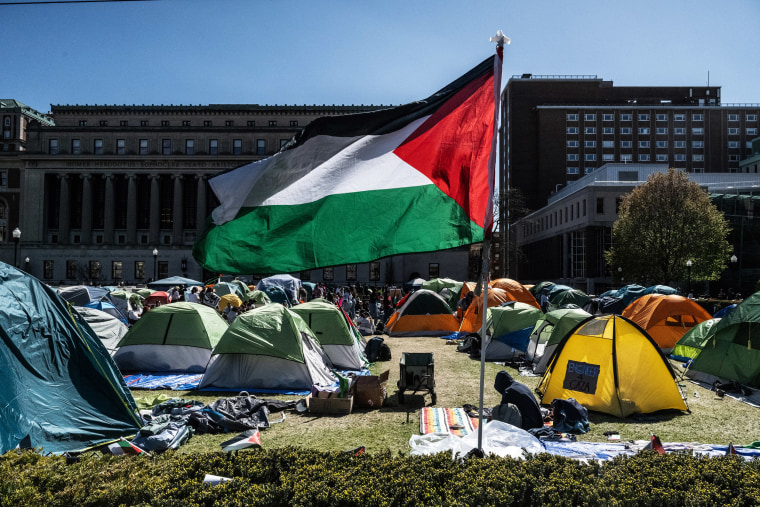
‘It’s not going to be a cakewalk’
Civil rights groups and advocates for Palestinian rights say they are prepared to face Trump’s deportation threats if he is re-elected. And former federal prosecutors say that winning convictions for speech-related crimes will be challenging.
Columbia Law School professor Daniel Richman, a former federal prosecutor, said a successful prosecution for a speech-related crime would require federal investigators to prove that a visa holder was knowingly in communication with a member of a terrorist group. And that member would have to instruct the visa holder to express support for Hamas or another terrorist organization.
“If they instructed you to speak, that definitely counts,” said Richman, citing a federal law that prohibits providing material support to U.S.-designated terrorist organizations.
The Council on American–Islamic Relations, one of the country’s largest Muslim American civil rights organizations, said no one has asked to or tried to raise Hamas flags at its protests. If he or she did, they said, CAIR wouldn’t allow it.
Edward Ahmed Mitchell, a board chair of CAIR Action, the organization’s political arm, acknowledged that visa holders don’t have the same free speech and civil rights protections as U.S. citizens or permanent residents with green cards.
“If a foreign student were to express support for an organization that’s been designated a terrorist group, that would obviously put them at legal risk, especially if they leave the country and try to come back,” Mitchell said. “The law is very clear that the government can deny entry to people for all sorts of reasons.”
Mitchell stressed, though, that most pro-Palestinian demonstrations haven’t involved violence or featured displays of support for Hamas.
“When Mr. Trump threatens to deport people, he could try,” Mitchell said. “But if he’s trying to deport people solely based on speech, it’s not going to be a cakewalk.”
,




